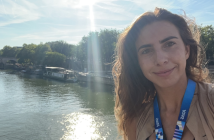On April 28, the Fordham Black Law Students Association (BLSA), the Fordham Irish Law Students Association (ILSA), and the Fordham Latin American Law Students Association (LALSA) hosted a webinar entitled “Global Civil Rights: Shared Inspirations,” attended by more than 100 people. In addition to the student-led organizations, the Fordham Center on Race, Law & Justice, Leitner Center for International Law & Justice, Feerick Center for Social Justice, and Fordham’s Alternative Dispute & Conflict Resolution Program also served as co-sponsors.
The webinar focused on the ways in which various civil rights movements across the globe influence and inspire one another. The idea for the event was sparked by the work of Fordham’s new Rule of Law Clinic, which focused on issues related to Northern Ireland this semester.
“During our time in the clinic this semester, under the guidance of Professor John Rogan and Dean Emeritus John Feerick, Dylan and I learned that the civil rights movement in Northern Ireland in the 1960s and 70s was directly inspired by the civil rights movement here in the United States,” said ILSA President John Winton.
“In speaking with experts during our clinic work, it became apparent that this is true of many civil rights movements across the globe. We decided, after speaking with representatives from BLSA and LALSA, to put together an event that would explore these connections in greater detail beyond the Northern Ireland context,” Dylan McGowan, ILSA Vice President, added.
From the U.S. to India to Ireland, Civil Rights Struggles Feed Off One Another
The panel was composed of legal academics and human rights experts with a wide range of experience studying social movements and global civil rights. Professor Kevin Brown of the Maurer School of Law at Indiana University–Bloomington, spoke about the ways in which the African American civil rights movements and groups in the United States motivated the Dalits in India.
“[Dalits] have been inspired by the African American struggle…Back in the early 1970s, a group called the Dalit Panthers, a group inspired by the Black Panther Party, was created to reach for liberation of Dalits by any means necessary. In addition, the Dalits have created Dalit Capitalism…inspired by Black Capitalism,” said Brown. “They in fact created Dalit Enterprise magazine, inspired by Black Enterprise magazine. And even before you saw the global embrace of the Black Lives Matter movement this summer, the Dalits had already created Dalit Lives Matter, once again inspired by Black Lives Matter.”
Brown also noted that slogans and songs that would be familiar to many here in the U.S. were adapted for use in the Dalits’ cause, “Indeed, they even sing the iconic civil rights song ‘We Shall Overcome’ in some of their own rallies.”
Brian Dooley, a human rights expert, highlighted the connection between civil rights in America and Northern Ireland. He noted that in the mid-19th century it was the Irish struggle for equality that helped influence the abolition and civil rights movements in the United States.
“For the hundred years, more or less, between the mid-1800s and the mid-1900s, the two movements fed off each other,” he said. “The struggle for rights and liberation in Ireland, and the struggle for rights and liberation in the US. But most of that traffic in terms of influence across the Atlantic washed from East to West, in that the US struggle was, by and large, influenced by the Irish experience. Frederick Douglass goes to Ireland in the 1840s…and learns a lot about the Irish struggle. A generation later, Marcus Garvey is in London, and sees this embryonic but then thriving movement of a new surge in Irish nationalism, and he deliberately copies the iconography and the slogans of the young Sinn Fein movement…He designs the African liberation flag and includes Green in it as an homage to the Irish struggle. He’s in contact with some of the Irish revolutionaries during the 1920s, and the Harlem Renaissance too, on a more cultural level, borrows very deliberately from the Gaelic revival of 20 or 30 years before.”
Dooley also described how the influence changed directions in the 1960s and 1970s, with the Irish finding inspiration from Dr. Martin Luther King, Kr. and other prominent African American civil rights leaders. “That brings us up to the mid-20th century…After that, the influence tended to wash back more the other way. Bernadette Devlin McAliskey [an Irish civil rights leader]told me that they saw what was happening in the US in terms of the Freedom Riders, the push to desegregate public facilities, ‘In our protests they sat down, so we sat down” Dooley recounted. “There was an absolute copycatting of tactics there…Really it was the Irish struggle that was adopting from the American.”
Professor Ediberto Román, professor of law at the Florida International University College of Law, spoke about the experience of immigrants in America in recent years as the country has experienced increased nationalism and isolationism. “When I look at social movements, they’re about engendering an understanding,” he said. “One of my goals is to be able to have the person listening situate themselves in the position of the victim, to understand the pain and the struggles of the aggrieved, because absent that, they always remain as an other.”
Román continued, “I think it’s the role of [older people who have experienced these movements]to remind us of prior movements, of successes, of challenges, of failures…[It’s important] to remember the efforts of Latinos and Latinas, be in it terms of the Chicano studies movement, that resemble the 1960s movement.”
The discussion was moderated by Fordham Professor and Director of the ADR & Conflict Resolution Program Jacqueline Nolan-Haley, who has worked extensively in Northern Ireland and in Ghana, emphasizing the role that the mediation process can serve in enhancing human understanding and dignity. Following the panel’s opening remarks, panelists fielded questions from Nolan-Haley and the audience on topics ranging from the role international law plays in civil rights movements to how present day Irish-American sentiments may conflict with past connections and the way social movements interact, both positively and negatively, with theories of nationalism.
The program can be viewed in its entirety here.



